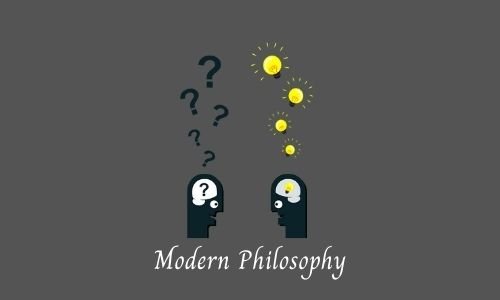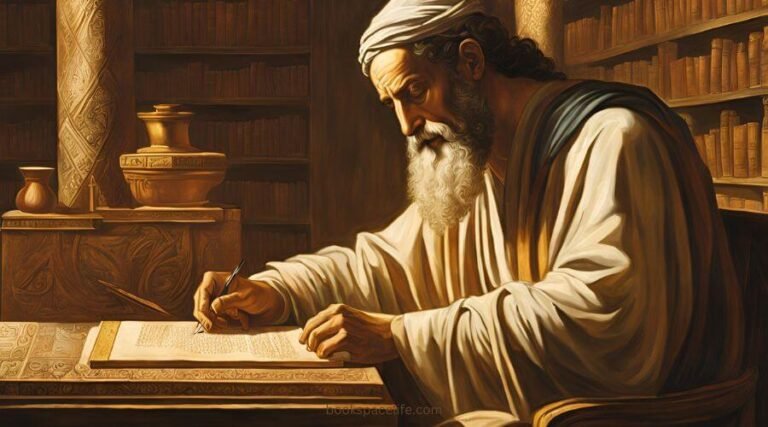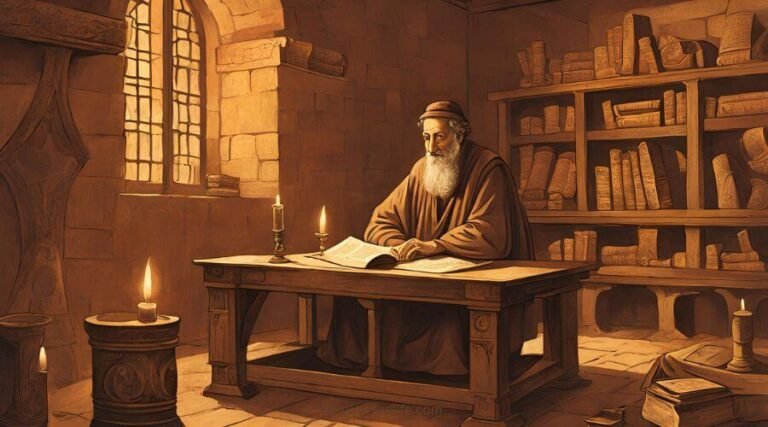Philo of Alexandria
Leo Strauss : Reviving Classical Philosophy and the Pursuit of Political Truth
Leo Strauss (1899 – 1973 CE) was a German-Jewish philosopher best known for his groundbreaking work in political philosophy.
His intellectual pursuits focused on reinterpreting classical texts and reviving ancient wisdom in the modern world.
Through his provocative critiques of modern philosophy, Strauss has influenced political thought, reshaping our understanding of ancient philosophy, liberalism, and the role of religion in politics.
This post delves into Strauss’s life, travels, education, and philosophical contributions, examining the impact he left on philosophy, politics, and culture.
Table of Contents
(1) Early Life and Education
Leo Strauss was born on September 20, 1899, in Kirchhain, a small town in Germany, into a Jewish family.
He grew up in a traditional Jewish community, where he was immersed in Jewish religious life and teachings from a young age.
However, as Strauss grew older, he found himself drawn to the study of philosophy and politics, ultimately choosing to pursue a secular education.
His upbringing and early experiences in a Jewish community would influence his later work, especially in regard to his explorations of religion and political philosophy.
Strauss attended the University of Marburg, where he studied under prominent scholars such as Ernst Cassirer, Edmund Husserl, and Martin Heidegger.
He was particularly influenced by Heidegger, who introduced him to the works of ancient Greek philosophers and encouraged him to grapple with fundamental questions about human existence.
While Heidegger’s philosophy impacted Strauss, their views on politics diverged greatly, especially as Heidegger became involved with the Nazi Party.
This ideological difference solidified Strauss’s search for a philosophical framework that would oppose totalitarianism and ground political life in ethical and rational principles.
In 1921, Strauss completed his doctoral thesis, focusing on the Jewish philosopher Baruch Spinoza.
His early studies on Spinoza’s critique of religion and politics shaped his lifelong interest in the intersection of reason, revelation, and politics.
(2) Travels and Exile
Strauss’s life took a drastic turn with the rise of the Nazi Party in Germany.
As a Jew, he faced persecution, and like many Jewish intellectuals, he fled Germany. Initially, Strauss moved to France and later to England, where he continued his research and wrote on political philosophy.
However, his most significant intellectual journey began in 1938 when he emigrated to the United States.
Arriving in the U.S., Strauss joined the New School for Social Research in New York City.
In 1949, he accepted a position at the University of Chicago, where he spent the rest of his career.
Strauss’s tenure at the University of Chicago marked the most productive period of his life, where he developed his theories on classical philosophy and political thought, taught generations of students, and became an influential voice in American academia.
(3) Strauss’s Philosophy: Rediscovering Ancient Wisdom
At the core of Strauss’s philosophy was a conviction that modern philosophy had lost touch with essential truths that ancient thinkers had once understood.
He argued that philosophers like Plato, Aristotle, and Maimonides possessed insights into human nature and political life that modernity had obscured.
Strauss believed that modern philosophy, with its focus on progress, relativism, and scientific rationality, was inadequate to address the ethical and political crises of the 20th century.
Strauss’s critique of modernity led him to revive the study of ancient texts and the method of “esoteric reading,” which he argued was necessary for uncovering hidden layers of meaning in philosophical works.
Strauss believed that philosophers in ancient times often wrote in an indirect or “esoteric” manner, embedding their true teachings within their texts in ways that were accessible only to a careful reader.
He suggested that this was a strategy used by thinkers in order to avoid persecution in societies that were hostile to certain ideas.
By studying these texts with close attention, Strauss argued that readers could access the underlying truths about politics, ethics, and human nature.
(i) Esoteric Writing and the Hidden Meaning of Texts
Strauss’s notion of esoteric writing became a central concept in his methodology.
In his reading of classical texts, Strauss proposed that ancient philosophers like Plato and Aristotle wrote with different audiences in mind, sometimes using an exoteric (or external) layer for the public and an esoteric (or hidden) message for a select few.
Strauss argued that philosophers often concealed controversial views on topics such as religion, governance, and virtue.
For Strauss, these thinkers saw that the general public might not be ready to understand or accept these radical ideas, which might threaten social order or challenge accepted religious beliefs.
He saw Plato’s dialogues and Maimonides’ writings as examples of this esoteric approach.
This interpretative method became controversial, as critics accused Strauss of projecting his own ideas onto the texts.
However, for Strauss, this approach was not just a reading strategy but a pathway to rediscovering truths about human life and society.
Strauss’s interpretation of classical texts encouraged readers to question conventional wisdom and to see philosophy as an ongoing dialogue with the past.
(ii) Political Philosophy: Classical vs. Modern
A fundamental part of Strauss’s philosophy involved his critique of modern political philosophy, which he saw as morally relativistic and skeptical of universal truths.
Strauss argued that philosophers like Hobbes, Locke, and Rousseau introduced a modern worldview that placed human will and power over ethical principles rooted in nature.
By rejecting objective standards of right and wrong, Strauss believed that modern philosophy led to moral and political instability.
Strauss contrasted modernity with classical political philosophy, which he believed embraced enduring truths about virtue, justice, and the good life.
For Strauss, Plato and Aristotle offered insights into human nature that were grounded in a stable understanding of the human soul and the purposes of society.
By re-engaging with these ancient ideas, Strauss believed that individuals could resist the nihilistic tendencies of modern life.
His critique of modernity extended to liberalism, which he believed had become disconnected from moral and ethical principles.
Strauss argued that liberal societies, while valuing freedom, lacked a coherent moral foundation, making them vulnerable to ideologies that could exploit this vacuum, such as fascism or radical nihilism.
While Strauss recognized the strengths of liberal democracy, he warned that without a commitment to transcendent values, liberal societies could become morally aimless.
(4) Influence and Legacy
Strauss’s teachings and writings left a profound impact on American academia and political thought, inspiring a range of interpretations and debates that continue today.
His influence is particularly strong among scholars in political philosophy, intellectual history, and Jewish studies.
- The “Straussians” and Academia: Strauss trained a generation of students at the University of Chicago who would go on to shape political thought in the United States. Known as “Straussians,” these students included prominent scholars like Allan Bloom, Harry Jaffa, and Walter Berns, who furthered Strauss’s ideas on classical political thought, liberal democracy, and moral philosophy. Straussians continue to work in political philosophy departments and think tanks, where they promote Strauss’s emphasis on classical wisdom and critique of modernity.
- Impact on American Conservatism: Strauss’s critique of modern liberalism resonated strongly within conservative intellectual circles, particularly during the Cold War. His warnings about moral relativism and the dangers of totalitarianism found an audience among American conservatives who sought to ground political life in stable, ethical principles. Though Strauss himself avoided direct involvement in politics, his ideas indirectly influenced neoconservatism in the U.S., where his followers emphasized the importance of strong moral and democratic values in international policy.
- Reevaluation of Jewish Philosophy: Strauss’s works on Jewish philosophy, particularly his study of Maimonides, encouraged a reexamination of Jewish thought in the context of Western philosophy. Strauss saw Maimonides as a thinker who, like Plato and Aristotle, grappled with the relationship between reason and revelation. Through his work on Jewish philosophy, Strauss contributed to a renewed interest in Jewish thinkers as serious participants in the philosophical tradition. His explorations of the tension between Athens (philosophy) and Jerusalem (faith) inspired Jewish scholars to reconsider the contributions of Jewish thought to philosophical questions about ethics, politics, and the nature of God.
- Controversy and Criticism: Despite his influence, Strauss’s work has been subject to criticism. Some scholars argue that his esoteric reading methodology is speculative and risks distorting classical texts. Others criticize his impact on political conservatism, suggesting that Strauss’s ideas have been misinterpreted or used to justify political agendas. Some liberal and progressive scholars also accuse Strauss of elitism, arguing that his approach to classical philosophy is exclusionary.
(5) Conclusion: The Lasting Impact of Leo Strauss
Leo Strauss’s philosophy continues to spark debate and provoke thought decades after his death.
By reintroducing the wisdom of ancient philosophers and advocating for a return to classical ideals, Strauss offered a powerful critique of modernity and its shortcomings.
His work serves as a reminder that, while societies may progress technologically and scientifically, ethical and philosophical truths may lie in enduring questions that remain relevant across generations.
Strauss’s exploration of political philosophy and his examination of reason and revelation have shaped conversations about democracy, liberalism, and the nature of human society.
His influence on political thought and Jewish philosophy has left an indelible mark, encouraging readers to view classical texts not as relics of the past but as sources of insight into timeless truths.
Leo Strauss reminds us of the importance of asking fundamental questions and seeking wisdom in unexpected places.
His legacy lives on in the ongoing search for truth, justice, and understanding in a world often swayed by ideological currents, reminding us to look to the past to find the wisdom we may need in the present.







